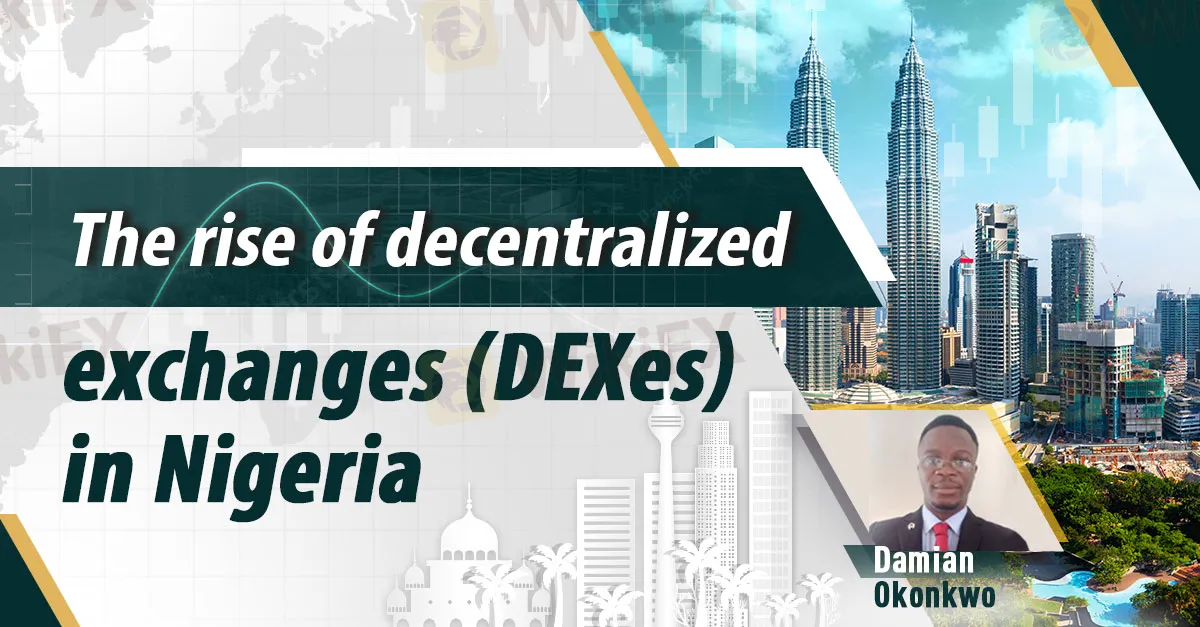简体中文
繁體中文
English
Pусский
日本語
ภาษาไทย
Tiếng Việt
Bahasa Indonesia
Español
हिन्दी
Filippiiniläinen
Français
Deutsch
Português
Türkçe
한국어
العربية
The rise of decentralized exchanges (DEXes) in Nigeria
Abstract:The rise of decentralized exchanges in Nigeria is a reflection of the global trend toward blockchain technology and decentralized finance (DeFi). While these platforms offer numerous advantages, including enhanced security and financial inclusion, they also come with their own set of risks and challenges.

By: Damian Okonkwo

Introduction
Nigeria, often referred to as the giant of Africa, is known for its vibrant economy and a growing interest in cryptocurrencies and blockchain technology. In recent years, the rise of decentralized exchanges (DEXes) has garnered significant attention in the Nigerian financial landscape. These platforms offer a new way for Nigerians to engage with cryptocurrencies, providing greater access, security, and control over their digital assets. This article explores the factors contributing to the growing popularity of DEXes in Nigeria and its potential implications for the country's financial market.
Meaning of Decentralized Exchanges (DEXes)
A decentralized exchange, or DEX, is a type of cryptocurrency exchange that operates without a centralized authority. Unlike traditional centralized exchanges (CEXes) such as Binance or Coinbase, which act as intermediaries to facilitate trades, DEXes enable peer-to-peer transactions. They use smart contracts and blockchain technology to connect buyers and sellers directly, without the need for an intermediary. This decentralization offers several advantages, including increased security, privacy, and control over one's funds.
Factors Driving the Rise of DEXes in Nigeria
a) Security and Trust:
Nigeria has faced security challenges in the past, including fraud and hacking incidents on centralized exchanges. DEXes, with their non-custodial nature, offer greater security by allowing users to retain control of their private keys. This level of control is appealing to Nigerians who have concerns about the safety of their digital assets.
b) Financial Inclusion:
DEXes provide an opportunity for financial inclusion, as they allow Nigerians to access cryptocurrencies and trade without the need for traditional banking services. This is particularly important in a country where many individuals are unbanked or underbanked.
c) Regulatory Uncertainty:
The regulatory environment for cryptocurrencies in Nigeria has been somewhat uncertain, with occasional government pronouncements causing concern among crypto enthusiasts. DEXes, which operate without a central authority, can be seen as a way to bypass potential regulatory restrictions.
d) Liquidity and Trading Pairs: Many DEXes offer a wide range of trading pairs, including those that may not be available on centralized exchanges. This appeals to traders seeking to diversify their portfolios.
e) Global Access:
DEXes are accessible to anyone with an internet connection, enabling Nigerians to participate in the global cryptocurrency market without the need for complex identity verification processes.
Ten Most Popular Decentralized Exchanges in Nigeria
● Binance DEX
● LocalBitcoins
● Paxful
● Bitkoin Africa
● Quidax
● Remitano
● NairaEx
● CoinCola
● Yellow Card
● Busha
Challenges and Risks
While the rise of DEXes in Nigeria is promising, it is essential to acknowledge the challenges and risks associated with these platforms:
● Regulatory Concerns: The lack of regulatory oversight in DEXes can be a double-edged sword. While it offers more freedom, it also exposes users to potential risks, such as scams and fraudulent projects.
● Lack of Customer Support: DEXes often lack the customer support that centralized exchanges offer. This can be problematic for users who encounter issues with their transactions.
● Market Volatility: The cryptocurrency market is highly volatile, and DEXes are no exception. Traders must be aware of the risks and invest cautiously.
Conclusion
The rise of decentralized exchanges in Nigeria is a reflection of the global trend toward blockchain technology and decentralized finance (DeFi). While these platforms offer numerous advantages, including enhanced security and financial inclusion, they also come with their own set of risks and challenges. Nigerians looking to engage with DEXes should exercise caution, conduct thorough research, and remain aware of the evolving regulatory landscape.

Disclaimer:
The views in this article only represent the author's personal views, and do not constitute investment advice on this platform. This platform does not guarantee the accuracy, completeness and timeliness of the information in the article, and will not be liable for any loss caused by the use of or reliance on the information in the article.
Read more

TradingView Brings Live Market Charts to Telegram Users with New Mini App
TradingView has launched a mini app on Telegram, making it easier for users to track market trends, check price movements, and share charts.

USD/INR, USD/PHP Forecast April 2025
The global forex markets are bracing for April 2025 with divergent forecasts for key emerging market pairs. In particular, the USD/INR and USD/PHP pairs have attracted significant attention amid a mix of central bank interventions, evolving U.S. policy signals, and regional economic shifts. In this article, we review multiple forecasts, examine the driving factors, and outline what traders might expect as the month unfolds.

April Forex Trends: EUR/USD, GBP/USD, USD/JPY, AUD/USD, USD/CAD Insights
Know April’s forex seasonality trends for EUR/USD, GBP/USD, USD/JPY, AUD/USD, and USD/CAD. Historical insights and key levels to watch in 2025.

Should You Beware of Forex Trading Gurus?
Know the reality behind forex trading gurus, examining their deceptive tactics, inflated promises, and the risks associated with trusting them for financial advice.
WikiFX Broker
Latest News
Exposing the Top 5 Scam Brokers of March 2025: A Closer Look by WikiFX
Gold Prices Climb Again – Have Investors Seized the Opportunity?
Webull Launches SMSF Investment Platform with Zero Fees
Australian Regulator Warns of Money Laundering and Fraud Risks in Crypto ATMs
The Withdrawal Trap: How Scam Brokers Lure Victims into Paying More
FCA to Investors: Think Twice Before Trusting These Brokers
Trump\s tariffs: How could they affect the UK and your money
Trump gambles it all on global tariffs he\s wanted for decades
TradingView Brings Live Market Charts to Telegram Users with New Mini App
Trump tariffs: How will India navigate a world on the brink of a trade war?
Currency Calculator







